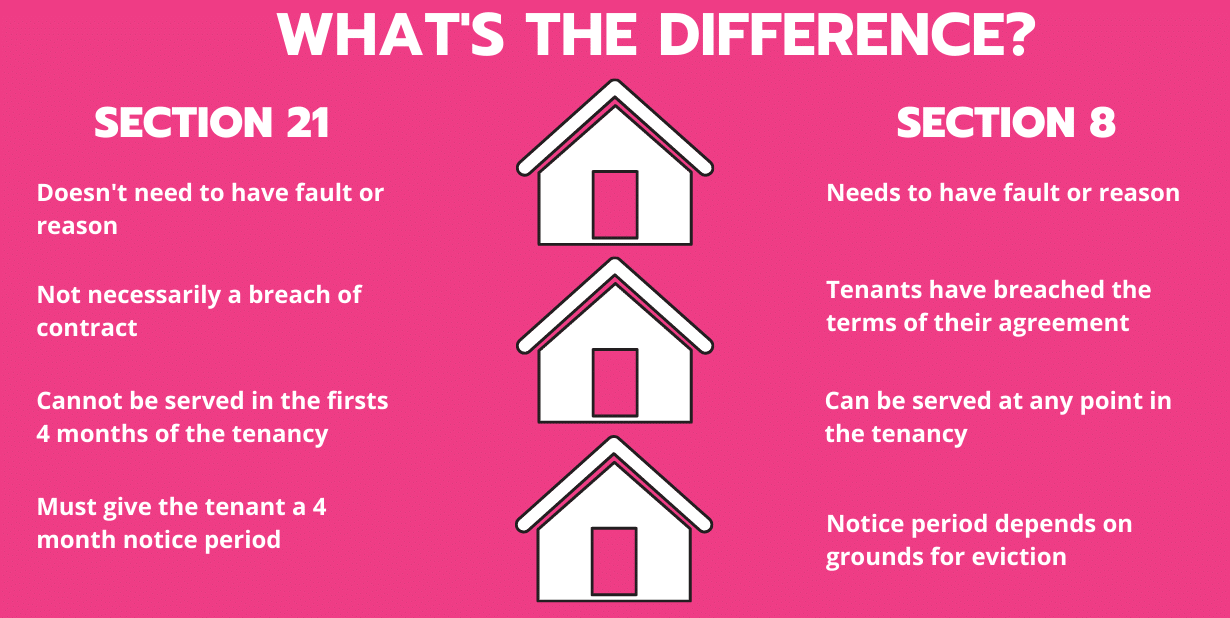How to Evict a Tenant | Read Time 5 Minutes.
If you’re a landlord and you’re having issues with your tenant, you may be able to serve an eviction notice.
Eviction is the court-ordered removal of a tenant from a property. There’s more than one way to evict a tenant. This depends on why the eviction is taking place and what the end result needs to be. To serve an eviction notice, both landlord and tenant must meet certain criteria so that the process can run smoothly.
If you’re a private landlord and you’re looking to evict your tenant, get in touch today, and we can connect you with an experienced landlord and tenant lawyer.
Why might a landlord want to evict a tenant?
In the UK, there are approximately 3 million landlords.
Deciding to rent out your property is a huge decision, and comes with a lot of responsibility. Unfortunately, renting out your property doesn’t always go to plan, and in the event that it doesn’t, you may need to ask your tenant to leave.
In England and Wales, there are two types of eviction notices that a landlord can use to evict a tenant. The one they choose will depend on the circumstances of the eviction.
1. A Section 21 Eviction Notice is typically served when there is no fault or blame in the eviction.
2. A Section 8 Eviciton Notice is typically used when the tenant has breached the terms of their tenancy agreement.

Section 21 Eviciton Notice
Most private landlords will choose a section 21 eviction notice as the first step to evict a tenant. A section 21 notice is also known as a “no-fault eviction” notice, where the landlord does not need to provide a reason for the eviction. The landlord may want to serve this notice if:
- They want to move into the property themselves
- Sell the property
- Simply do not have a reason for the eviction
- The tenancy was a short-let or holiday-let
Be aware that you can only serve a section 21 notice if the fixed term of the tenancy has come to an end. You can also only serve a section 21 notice after the tenant has lived in the property for 4 months.
Landlord requirements for a section 21
The biggest problem with evictions is that they can be quite complex, especially if executed incorrectly. Some landlords may not realise that they need to meet a set of criteria before they can legally serve a section 21 eviction notice. These include:
- Serving an energy performance certificate
- Protecting their deposit in a deposit protection scheme (if one was taken)
- Providing a how to rent booklet
- Serving an energy performance certificate
- Serving a gas safety certificate
If you want to serve a section 21 notice but have failed to comply with any of the above conditions, you will need to remedy them before you can serve a notice.

Section 8 Eviction Notice
Unlike a section 21 notice, a section 8 notice is a fault-eviction, where you can evict a tenant because they have breached the terms of their tenancy. Unlike a section 21 notice, a section 8 can be served at any point in a tenancy. To serve a section 8 notice, the tenant must have breached at least 1 of the 17 “grounds” for eviction. These 17 grounds are split into mandatory and discretionary grounds:
- Mandatory (where the court must grant the eviction) include things like the death of a tenant, rent arrears or if the property is a holiday let.
- Discretionary (where the court may grant the eviction after review) includes anti-social behaviour, frequent failure to pay rent, property neglect and domestic abuse.
*Please note: the tenant can contest discretionary grounds for a section 8 eviction.
How to evict a tenant
1. Identify the type of tenancy
The first step to evict a tenant is to identify the type of tenancy that the tenant has. Most tenancies in the UK are Assured Shorthold Tenancies (ASTs), meaning the property is privately rented and the landlord does not live in the property with the tenant. If the tenancy is not an AST.
2. choose your notice
The second step is to make sure you know which notice you would like to serve, whether this is a section 21 or a section 8
3. draft and serve the notice
The third step is to draft and serve your notice. While you can do this without legal assistance, you may encounter several issues if you incorrectly serve the notice. For example, if you serve a section 21 notice to a tenant but haven’t complied with the previously mentioned terms, your notice will become invalid

What happens if my tenant doesn’t leave?
By law, a tenant does not have to leave their property when an eviction notice is served if they believe they have grounds to contest it.
If the tenant hasn’t left by the date on the notice, you can issue a possession claim. The type of possession claim you issue depends on what kind of eviction notice was served.
- An accelerated possession claim is commonly used when a section 21 notice is served, and the landlord is not claiming any rent arrears.
- A standard possession claim is commonly used when a section 8 notice is served, and the tenant is likely to have outstanding arrears.
Following this, if the tenant is still refusing to leave, you can apply for a warrant of possession. This warrant will allow bailiffs to remove tenants from the property.
When do i need a lawyer?
If you want to evict a tenant, you should always seek legal advice first. Evictions can be a complicated process, especially if the eviction is contested or the tenant is particularly difficult. Having a lawyer on your side to make sure you draft and serve the correct eviction notice can save you a world of hassle down the line.
For more information, please visit our eviction page.
Need to evict a tenant?
Get in touch today to talk to one of our eviction lawyers.
SPEAK TO OUR TEAM ON 020 3795 9020



0 Comments